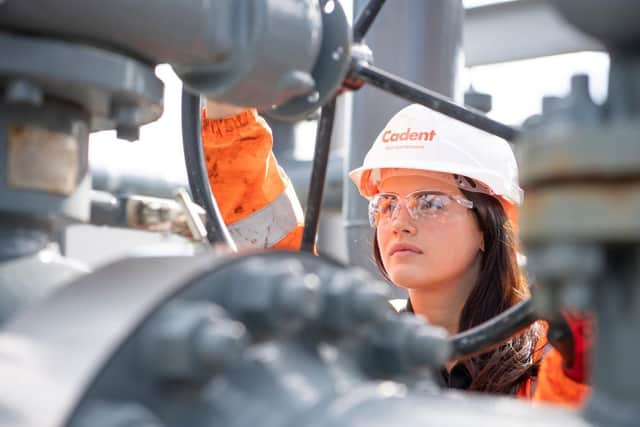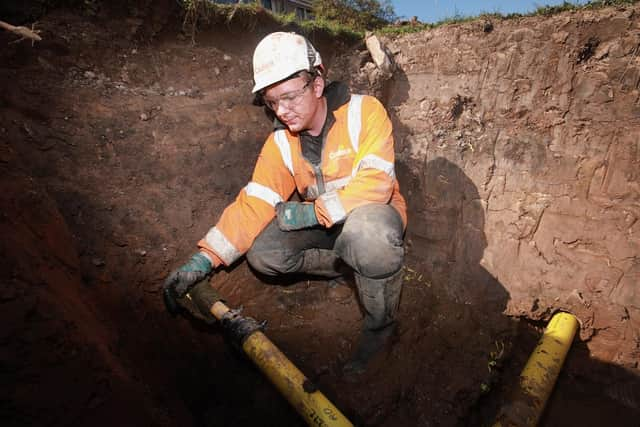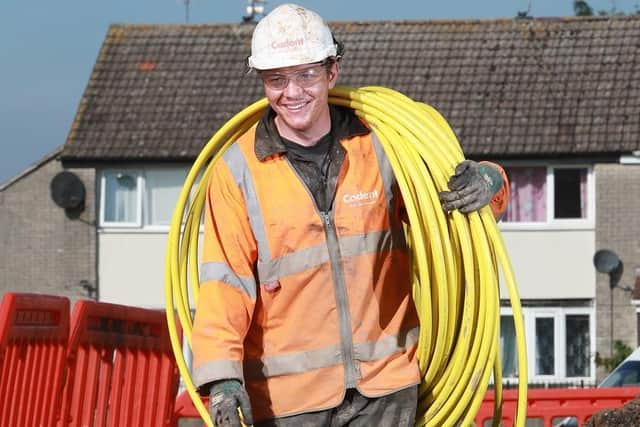Flame on! How Lancashire is preparing for the hydrogen revolution
and live on Freeview channel 276
As Britain increases efforts to cut carbon dioxide emissions following the COP26 conference in Glasgow, it will need to reduce its huge reliance of natural gas, particularly as home drilled stocks dwindle in the North Sea and Morecambe Bay and Russia flexes its muscles over its supplies to Europe.
So instead of using methane, a powerful greenhouse gas which produces another when burned, carbon dioxide, the country is now putting its mind to using hydrogen, whose by-product on burning is water.
Advertisement
Hide AdAdvertisement
Hide AdAlready companies across Lancashire are gearing up to use the cleaner gas for power, from Baxi in Preston building combi boilers for homes which can use hydrogen, to NanoSun of Lancaster making hydrogen fuel stations for vehicles. Even AB InBev, which has the huge brewery at Samlesbury, is looking to use hydrogen to power its plants and have net zero emissions by 2050.


Helen Boyle, head of regional development in the North West for Cadent which runs and maintains our network of gas pipes, said the next few years will see work on the expansion of the use of hydrogen ramp up.
Already plans are afoot to build the North West's first hydrogen generating plant - HyNet at the Stanlow plant at Ellesmere Port - which will supply industry in the area and fuel for cars and HGVs across the North West.
It will need to use natural gas as a feedstock, so is defined as "Blue Hydrogen" but will include a carbon capture facility to reduce emissions of the CO2 also produced and is seen as the first stepping stone to the supply and production of the gas by electrolysis of water "green Hydrogen", whose only by-product is Oxygen.
Advertisement
Hide AdAdvertisement
Hide AdHelen Boyle said pilot schemes were already advanced with so-called hydrogen villages testing use of the gas well under way and work already begun to replace old pipes with new plastic ones which can carry hydrogen to our homes.


The first stage will see household appliances run on 20 per cent hydrogen along with natural gas and then as more production ramps up and safety is proven, new boilers, cookers and home heating equipment will be made to run on 100 per cent hydrogen.
She said: "The next few years are really crucial, I would sort of describe it as being at the top of the Big One and were are about to go whoosh!
"Here in the North West we are going to have HyNet at Ellesmere Port that will be producing 3GW of hydrogen by the middle of this decade. It will be a phased project. Initially it will supply industry in that part of the area then move out across the North West."
Advertisement
Hide AdAdvertisement
Hide AdShe said there were still lots of questions that need answering around hydrogen and once done the Government needs to make policy decisions and change regulations but the use of hydrogen looks to be a given for decarbonising industry, for HGVs and emergency response vehicles which can't spend time sat around waiting for batteries to be recharged.


A ten point plan was produced last Christmas and a programme called HyDeploy is taking place testing use of hydrogen.
"One of the first thing it talks about is using hydrogen blended with natural gas in our pipes. The reason it is 20 per cent hydrogen is because at that level it does not have an affect on our gas boilers, cookers and fires. If it can be rolled out everywhere it will be the equivalent of reducing carbon emissions of seven per cent in that setting or taking two and a half million cars off the road.
"Industry uses gas in its processes and we have to check that blending in hydrogen doesn't mess up any of those processes or affect quality of product and safety. Once those are complete, it will produce a package of information to present to BEIS.
Advertisement
Hide AdAdvertisement
Hide AdShe said if that works out then the move to 100 per cent hydrogen would be tested out. It will be tested on a "hydrogen village" demonstration of around 2,000 properties running on 100 per cent hydrogen for two years starting in around 2025.


"It sounds like quite a long time, however the Government is very supportive of hydrogen. It could make up to 35 per cent of the energy mix."
Private investors and companies are ready to buy in, once the initial feasibility and production pilots are completed.
"We work really closely with Baxi. You have to have the supply chain there first and then the appliances for people to buy. They have hydrogen ready boilers. If your boiler needs replacing now, you could by a hydrogen ready one, which can run on methane and on a 20 per cent mix of hydrogen in the future and then on 100 per cent hydrogen with just a small adaptation."
Advertisement
Hide AdAdvertisement
Hide AdShe said the new generation of boilers would be a similar price to existing ones rather than the expensive cost of air source heat pumps for houses.
Many readers will have heard of the Hindenburg disaster where the airship crashed to earth in flames after the hydrogen in its envelope caught fire , but the industry is confident it can be safely used in our homes.
She said: "Hydrogen can be as safe as natural gas in our homes, safety is a stage gate for this project. It's not completely new, its used in industry all the time and used to be in town gas many years ago.


"We will be spending £60m over the next five years on plastic pipes in Lancashire to make them hydrogen ready. If anywhere is going to get hydrogen in the next few years it will be the North West. We are replacing pipes at a rate of 80km a year and employing 200 people in Lancashire on the project. These are exciting times."